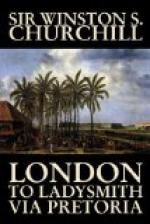The distance was short, so far as we were concerned, and surrounded by an escort of three armed policemen to each officer, we swiftly traversed two sandy avenues with detached houses on either hand, and reached our destination. We turned a corner; on the other side of the road stood a long, low, red brick building with a slated verandah and a row of iron railings before it. The verandah was crowded with bearded men in khaki uniforms or brown suits of flannel—smoking, reading, or talking. They looked up as we arrived. The iron gate was opened, and passing in we joined sixty British officers ‘held by the enemy;’ and the iron gate was then shut again.
’Hullo! How are you? Where did they catch you? What’s the latest news of Buller’s advance? Are we going to be exchanged?’ and a dozen other questions were asked. It was the sort of reception accorded to a new boy at a private school, or, as it seemed to me, to a new arrival in hell. But after we had satisfied our friends in as much as we could, suggestions of baths, clothes, and luncheon were made which were very welcome. So we settled down to what promised to be a long and weary waiting.
The States Model Schools is a one-storied building of considerable size and solid structure, which occupies a corner formed by two roads through Pretoria. It consists of twelve large class-rooms, seven or eight of which were used by the British officers as dormitories and one as a dining-room; a large lecture-hall, which served as an improvised fives-court; and a well-fitted gymnasium. It stood in a quadrangular playground about one hundred and twenty yards square, in which were a dozen tents for the police guards, a cookhouse, two tents for the soldier servants, and a newly set-up bath-shed. I do not know how the arrival of other prisoners may have modified these arrangements, but at the time of my coming into the prison, there was room enough for everyone.
The Transvaal Government provided a daily ration of bully beef and groceries, and the prisoners were allowed to purchase from the local storekeeper, a Mr. Boshof, practically everything they cared to order, except alcoholic liquors. During the first week of my detention we requested that this last prohibition might be withdrawn, and after profound reflection and much doubtings, the President consented to countenance the buying of bottled beer. Until this concession was obtained our liquid refreshment would have satisfied the most immoderate advocate of temperance, and the only relief was found when the Secretary of State for War, a kind-hearted Portuguese, would smuggle in a bottle of whiskey hidden in his tail-coat pocket or amid a basket of fruit. A very energetic and clever young officer of the Dublin Fusiliers, Lieutenant Grimshaw, undertook the task of managing the mess, and when he was assisted by another subaltern—Lieutenant Southey, of the Royal Irish Fusiliers—this became an exceedingly well-conducted concern. In spite of the high prices prevailing in Pretoria—prices which were certainly not lowered for our benefit—the somewhat meagre rations which the Government allowed were supplemented, until we lived, for three shillings a day, quite as well as any regiment on service.




